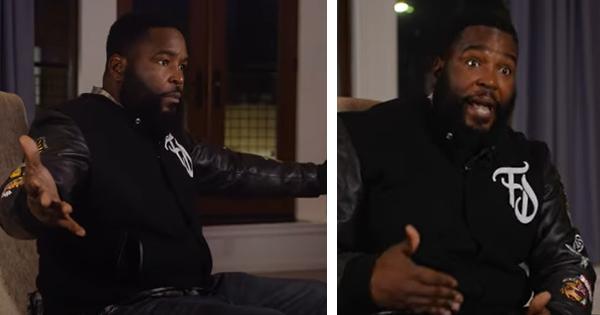
Nationwide — Dr. Umar Johnson, a respected psychologist, educator, and community advocate, on a recent episode of The Art of Dialogue podcast, has weighed in on the sexual assault allegations recently brought against Shawn “Jay-Z” Carter. Known for his critical insights on systemic issues affecting Black communities, Dr. Umar has raised several pointed questions about the plausibility of the accuser’s claims, the legal framework under which the allegations are being brought, and the broader implications for high-profile Black figures.Dr. Umar’s first concern lies with the accuser’s narrative and timeline. According to the allegations, the accuser, who was 13 years old at the time, attended the 2000 MTV Video Music Awards (VMAs) and an afterparty at a private location. Dr. Umar questions the logistics of this claim, particularly how a minor could attend such a high-profile event without adult supervision or even a legitimate ticket. “How does a 13-year-old even get there without her parents knowing? How does she have a friend who drives her to Radio City Music Hall?” he asks, noting the improbability of the scenario as described. Drawing on his experience as a child advocate, he highlights the lack of safeguards that should have been in place for a child of that age.
Additionally, Dr. Umar scrutinizes the legal claims made in the case, particularly the apparent lack of material evidence. He points out that the allegations rely heavily on the accuser’s account, with no corroborating witnesses or physical evidence cited thus far. “How do we know she was even at the party? How do we know Jay-Z or anyone else was in the same room with her?” he asks. Dr. Umar finds the claim that the accuser was presented with a non-disclosure agreement (NDA) particularly perplexing, as minors cannot legally sign such documents. He argues that this raises further questions about whether the accuser misrepresented her age at the time, a detail that could impact the case significantly.
The timeline of the allegations—surfacing 24 years after the alleged incident—also raises concerns for Dr. Umar. He questions how, after such a long period, the accuser intends to substantiate her claims. “If there’s no video surveillance, no witnesses, and no material evidence, how do you prove these allegations beyond a reasonable doubt?” he asks. He also notes the difficulty of identifying individuals from decades-old memories, particularly in high-profile settings like an awards show afterparty.
Dr. Umar ties these allegations to a larger conversation about systemic bias and the treatment of prominent Black men in the United States. He draws parallels to past cases involving Bill Cosby, R. Kelly, and now Sean “Diddy” Combs, arguing that a disturbing pattern is emerging. “In the last six years, we’ve seen a Black male billionaire publicly destroyed almost every 18 months,” he notes, citing a possible agenda to dismantle the reputations of powerful Black men. Dr. Umar emphasizes that while accountability for any wrongdoing is necessary, the frequency and nature of these cases against Black men compared to their white counterparts warrant deeper examination.
One of the most troubling aspects of the case for Dr. Umar is the New York City Council’s 2022 amendment to the Gender-Based Violence Protection Act, which he believes may have been specifically designed to target high-profile individuals like Jay-Z and Diddy. The amendment allows survivors of abuse to file civil lawsuits without any statute of limitations, opening the door for decades-old cases to be revisited. While Dr. Umar acknowledges the importance of providing justice for survivors, he questions the timing of the amendment. “Why amend this 22-year-old law now? Why open a two-year window for cases with no statute of limitations right as these allegations against Jay-Z and Diddy emerge?” he asks, suggesting a possible coordinated effort to weaponize the legal system against influential Black men.
Dr. Umar also critiques the media’s handling of the case, particularly its timing and framing. He notes that the allegations against Jay-Z were released just after Billboard honored Beyoncé, his wife, as Artist of the Century, and just before their daughter, Blue Ivy, was set to make her red-carpet debut for the film Mufasa: The Lion King. “I think it’s bad character to try to drag Beyoncé and their children into this,” he says, calling for the media to focus on the facts of the case rather than using it as an opportunity to smear the Carter family’s image.
Despite his criticisms of the allegations, Dr. Umar is clear that he is not defending any wrongdoing. “If these allegations are true, Jay-Z and anyone else involved should face the consequences,” he says. However, he stresses that the principle of due process must be upheld. Dr. Umar warns against rushing to judgment, particularly in cases involving Black men, where public perception often leans toward guilt before evidence is fully examined. He notes that the societal tendency to prematurely “cancel” Black celebrities without proof can have devastating effects on families, legacies, and the community as a whole.
Ultimately, Dr. Umar’s argument is not about defending individuals but about ensuring fairness and impartiality in the judicial process. He urges the public to question the broader implications of these cases, particularly how they intersect with systemic racism and the dismantling of Black power structures. “We must defend everyone’s right to a fair trial,” he says, cautioning against using allegations to convict individuals in the court of public opinion. Dr. Umar’s analysis highlights the need to critically examine not only the details of this case but also the societal and legal systems in which it is unfolding.
